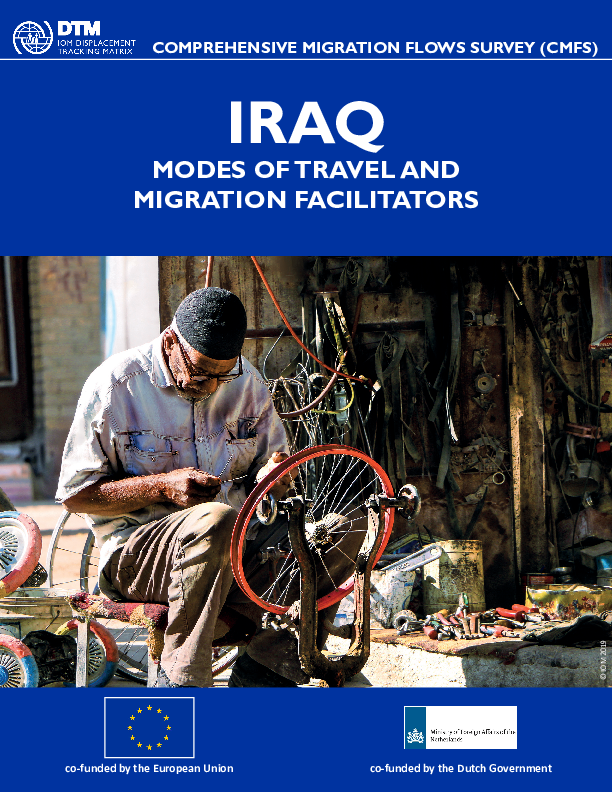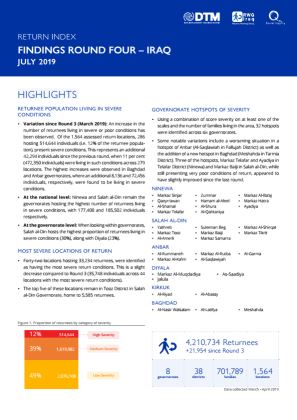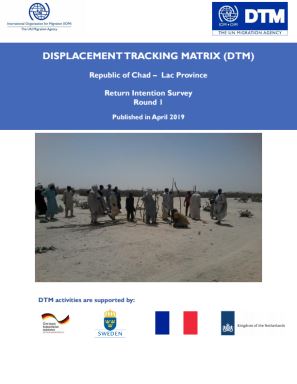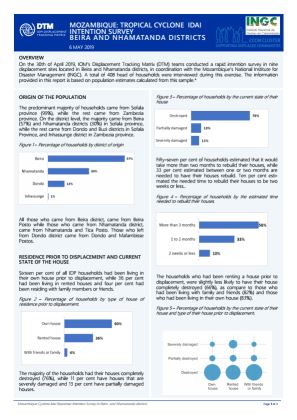-
Countries
-
Data and Analysis
-
Special Focus
-
Crisis Responses
Return Intention

Contact
DTM Iraq, IraqDTM@iom.int
Language
English
Location
Iraq
Period Covered
Jan 01 2017
Dec 31 2017
Activity
- Survey
- Return Intention
- Mobility Tracking
- Baseline Assessment
This report was produced with the financial assistance of the European Union (EU) and the Ministry of Foreign Affairs of the Netherlands. Data was collected through DTM’s Comprehensive Migration Flows Surveys (CMFS) methodology that aims to enable a better understanding of migration flows from Afghanistan, Ethiopia, Iraq, Nigeria, Pakistan and Somalia towards Europe, a collaborative effort by the DTM support team and relevant IOM field missions funded by the Dutch Ministry of Foreign Affairs. This report is part of the outputs under the EU-funded project “Regional Evidence for Migration Analysis and Policy (REMAP)”. The objective of DTM REMAP is to strengthen the evidence-based formulation and implementation of humanitarian and development policy and programming on migration and forced displacement in Afghanistan, Bangladesh, Iran, Iraq and Pakistan through the use of the Displacement Tracking Matrix (DTM).

Contact
DTM Iraq, IraqDTM@iom.int
Language
English
Location
Iraq
Period Covered
Mar 01 2019
Apr 30 2019
Activity
- Survey
- Return Intention
- Mobility Tracking
- Baseline Assessment
An increase in the number of returnees living in severe or poor conditions has been observed. Of the 1,564 assessed return locations, 286 hosting 514,644 individuals (i.e. 12% of the returnee population), present severe conditions. This represents an additional 42,294 individuals since the previous round, when 11 per cent (472,350 individuals) were living in such conditions across 279 locations. The highest increases were observed in Baghdad and Anbar governorates, where an additional 8,136 and 72,456 individuals, respectively, were found to be living in severe conditions. Data collection for the Return Index Round 4 took place during the months of March and April 2019 across eight governorates, 38 districts and 1,564 locations in Iraq. Since the previous round (collected in January–February 2019), the number of returnees has continued to increase and as of 30 April 2019, an additional 21,954 returnees were identified, reaching a total of 4,210,734 returnees (701,789 families). During Round 4, an additional 17 locations of return were assessed.

Contact
DTM Mali, DTMMali@iom.int
Language
French
Location
Mali
Snapshot Date
Jun 30 2019
Activity
- Survey
- Return Intention
- Flow Monitoring
- Mobility Tracking
- Baseline Assessment
La crise sécuritaire que le Mali a connu en 2012 a provoqué d’importants déplacements de populations tant à l’intérieur du territoire que vers les pays limitrophes. 192 communes ont été évaluées, dont 25 nouvelles communes. Une augmentation du nombre de personnes déplacées au Mali a été recensée entre mai et juin 2019. Le nombre de PDIs est en effet passé de 120 067 personnes (rapport CMP de mai 2019) à 147 861 en juin 2019 soit une augmentation de 27 794 individus. Cette augmentation est due à des violences variées dans les Régions de Mopti, Ségou, Tombouctou, Gao, Ménaka, Sikasso et la bande frontalière Mali-Burkina Faso. 39% des ménages déplacés vivent dans des familles d’accueils, 61% sur des sites spontanés. 33% des rapatriés enregistrés ne disposent pas de document d’Etat civil. Une grande partie des ménages vit d’aides et dons humanitaires (47%), d’aides communautés et/ou de tierces personnes (31%).

Contact
DTM Cameroon, DTMCameroon@iom.int
Language
English
Location
Cameroon
Period Covered
Mar 28 2019
Apr 08 2019
Activity
- Survey
- Return Intention
Within the context of the eighteenth round of Displacement Tracking Matrix (DTM) assessments in the Far North Region of Cameroon, a Return Intention Survey (RIS) was conducted with IDPs, Out of Camp Refugees and Returnees. The survey took place between 28 March - 08 April 2019 in 536 locations amidst the region's six department. 2,933 heads of households were interviewed in the course of the survey. 79% of IDPs and Out of Camp Refugees indicated they did not wish to leave their current location, while 18% wished to return to their location of origin and 3% expressed the wish to leave for a different location.

Contact
DTM Cameroun, DTMCameroon@iom.int
Language
French
Location
Cameroon
Period Covered
Mar 28 2019
Apr 08 2019
Activity
- Survey
- Return Intention
Dans le cadre de sa quatorzième phase de la Matrice de suivi des déplacements (DTM), l’Organisation Internationale pour les Migrations (OIM) a mené une enquête sur les intentions de retour ciblant les Personnes Deplacées Internes (PDI) et réfugiés hors camp dans la région de l’Extrême-Nord du Cameroun. L’enquête a eu lieu du 28 mars au 8 avril 2019 dans les six départements de la région: Diamare, Mayo-Danay, Mayo-Kani, Mayo Tsanaga, Mayo-Sava, et Logone-et-Chari. L'enquête a été menée dans 536 localités auprès de 2 933 ménages deplacés. 79% des PDI et réfugiés ne souhaitaient pas quitter le lieu actuel. 18% souhaitent retourner dans leur lieu d’origine et 3% souhaitaient se déplacer ailleurs.

Contact
DTM Chad, dtmtchad@iom.int
Language
English
Location
Chad
Period Covered
Feb 27 2019
Mar 18 2019
Activity
- Survey
- Return Intention
- Mobility Tracking
The International Organization for Migration (IOM) has been implementing the Displacement Tracking Matrix (DTM) in Chad since May 2015 to collect information about displacement caused by the conflict currently affecting the Lac Province. The information collected is intended to provide both humanitarian and government partners with a better understanding of the intentions and living conditions of displaced populations in the Lac Province. To this end, DTM conducted household-level surveys to learn more about their future intentions and the factors necessary for the sustainable reintegration of displaced populations. For the first round of Return Intention Surveys, 3,076 households were surveyed in 60 displacement locations (villages and sites) from 27 February to 18 March 2019. 96 per cent of IDPs do not intend to return to their area of origin. Fear is the reason for which 91 per cent of IDPs did not plan to return. 81 per cent of returnees believe they will be able to reintegrate their current place of residence. 91 per cent of households from the host community have trust in displaced persons. 96 per cent of IDPs and 93 per cent of returnees live in shelters made out of straw or metal sheet .

Contact
DTM Support, DTMSupport@iom.int
Language
English
Location
Mozambique
Period Covered
Apr 19 2019
Apr 30 2019
Activity
- Return Intention
On the 30th of April 2019, IOM’s Displacement Tracking Matrix (DTM) teams conducted a rapid intention survey in nine displacement sites located in Beira and Nhamatanda districts, in coordination with the Mozambique’s National Institute for Disaster Management (INGC). A total of 408 head of households were interviewed during this exercise in Beira and Nhamatanda

Contact
DTM South Sudan, SouthSudanDTM@iom.int
Language
English
Location
South Sudan
Period Covered
May 08 2019
May 08 2019
Activity
- Survey
- Return Intention
Following the recommendation from the Upper Nile Solutions Working Group, IOM and UNHCR conducted a joint survey in Malakal Protection of Civilian Site (PoC) to establish people’s intentions to return, the tentative time frame of return or relocation and preferred destinations, as well as present an analysis of people’s perceptions and aspirations on the way to move forward. The survey seeks to inform the work of humanitarian and transition/ recovery partners, as well as collaborative interventions by the Upper Nile Solutions Working Group.

Contact
DTM Chad, dtmtchad@iom.int
Language
French
Location
Chad
Period Covered
Feb 27 2019
Mar 18 2019
Activity
- Survey
- Return Intention
- Mobility Tracking
L’Organisation internationale pour les migrations (OIM) a mis en place la Matrice de suivi des déplacements (Displacement Tracking Matrix) au Tchad en mai 2015 pour obtenir des informations sur les déplacements engendrés par la crise. La mise en place de la DTM permet d’informer les partenaires humanitaires et gouvernementaux sur le déplacement et la mobilité dans la province du Lac. Dans le cadre de cette réponse, des enquêtes ont été menées auprès des ménages de personnes déplacées internes (PDI), retournées et des communautés hôtes pour recueillir des informations sur les intentions de retour et les facteurs de réintégration durable des populations déplacées. Pour le premier round des enquêtes sur les intentions de retour, 3 093 ménages ont été interrogés dans 60 lieux de déplacement (villages et sites) du 27 février au 18 mars 2019. 96% des PDI ont indiqué ne pas avoir l'intention de rentrer chez eux. La peur est la raison pour laquelle 91% des PDI n'envisagent pas de rentrer chez eux. 96% des PDI et 93% des retournés vivent dans des abris en tôle ou en paille. 81% des retournés penses pouvoir réintégrer le lieu dans lequel ils vivent actuellement. 91% des ménages des communautés hôtes ont confiance en les personnes déplacées.

Contact
DTM Iraq, IraqDTM@iom.int
Language
English
Location
Iraq
Period Covered
Jan 01 2019
Mar 31 2019
Activity
- Survey
- Return Intention
- Mobility Tracking
- Baseline Assessment
Of the assessed returnee population, 11 per cent (472,350 individuals) are living in high severity conditions across 279 locations. Ninewa and Salah al-Din governorates host the highest number of returnees living in these conditions with 213, 372 and 187,812 individuals, respectively. This proportion is relatively similar to the previous rounds published in September and January 2019, which had respectively 11% and 10% of returnees in this category.
The locations of return located in Al-Ba’aj District in Ninewa present the highest severity scores: there are very severe conditions in all of these locations, which host 10,722 returnees followed by Tooz District in Salah al-Din and Sinjar District in Ninewa, which are hosting 28,542 individuals (73%) in eight locations and 43,476 individuals (73%) in 40 locations, respectively.
Pagination
- Previous page
- Page 28
- Next page
